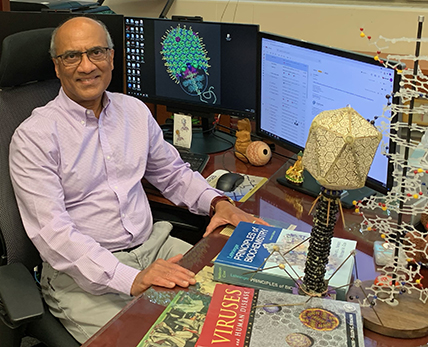Dr. Venigalla B. Rao Director: Bacteriophage Medical Research Center Director: The Center for Advanced Training in Cell and Molecular
Biology Education and Training:
Ph.D., Biochemistry, Indian Institute of Science, Bangalore, 1980
Postdoctoral Research, Molecular Virology, University of
Maryland School of Medicine. 1980-89
Honors:
Faculty Research Achievement Award, The Catholic University of America, 2009
James Youniss Research Award in Natural and Empirical Sciences (2021), The Catholic University of America
Fellow of American Academy of Microbiology, 2021
Teaching Interests:
Virology
Vaccines
Metabolic Biochemistry
Molecular Biology
Hobbies:
Running
Gardening
|
BIOGRAPHYDr. Venigalla B. Rao is a professor of biology at The Catholic University of America, Washington, DC, since 1989. He obtained his Ph. D. in biochemistry from the Indian Institute of Science, Bangalore, India in 1980, and received a post-doctoral research fellowship in the University of Maryland Medical School, Baltimore, MD, to study bacteriophage T4 assembly. In 1989, he joined the faculty of Biology at The Catholic University of America and got promoted to Associate Professor in 1994 and to full professor in 2000. He served as chair of Biology for 18-years (2001-2019), as chair of biology graduate programs for 24-years (1995-2019), and as director of the Center for advanced Training in Cell and Molecular Biology for 24-years (1997-current). In 2021, he founded the Bacteriophage Medical Research Center and currently serving as its founding director. In his 41-yr journey carrying basic-translational bacteriophage research, Dr. Rao has established a multi-disciplinary research program by integrating biochemistry, molecular genetics, bioinformatics, structural biology, single molecule biophysics, and immunology. Dr. Rao received numerous research awards from the National Institutes of Health and National Science Foundation. In a series of publications, his team reported the first functional and atomic descriptions of a viral genome packaging machine, a five-cylinder (subunit) engine that by oscillating in a piston-like fashion, generates electrostatic force that powers DNA transport and condensation inside a viral capsid. Using single molecule optical tweezers, his team showed that the phage T4 motor is the fastest and most powerful motor known to date, generating twice the power of an automobile engine. Single molecule fluorescence assays were developed to image individual packaging machines in real-time and showed that each packaging machine translocates DNA molecules in succession to fill phage head, analogous to a nanoscale vacuum. Translating basic knowledge into biomedical applications, Dr. Rao has developed new engineering concepts to transform bacteriophage T4 into a nanodevice to deliver vaccines, genes, and therapeutic complexes into human cells. The outer surface of phage capsid is decorated with pathogen antigens or protein-nucleic acid complexes while the interior was packaged with therapeutic DNA molecules. Combined with CRISPR engineering, he created artificial viruses that deliver customized payloads of vaccines and genetic therapies. A series of twenty-three patents were obtained and a dual anthrax-plague vaccine of National importance that afforded complete protection against two deadly bioterror agents, inhalation anthrax and pneumonic plague, was designed. Most recently, Dr. Rao’s team designed a broadly protective, needle-free, adjuvant-free, mucosal T4-COVID vaccine by CRISPR engineering that is now being commercially developed for human use. Dr. Rao was the first recipient of the Faculty Research Achievement Award established by The Catholic University of America that cited that his lifetime research accomplishments “extend or deepen the boundaries of knowledge”. He was also the first recipient of the James Youniss Research Award in Natural and Empirical Sciences (2021) named for distinguished emeriti faculty of The Catholic University of America. With a mission to take the basic discoveries from bench to bedside, Dr. Rao has founded the Bacteriophage Medical Research Center to create future therapies and cures for human genetic diseases such as sickle cell disease, muscular dystrophy, and cancer. Dr. Rao was elected in 2021 as a Fellow of the prestigious American Academy of Microbiology, an honorific branch of the American Society for Microbiology. |